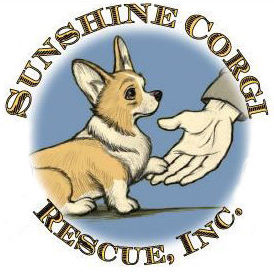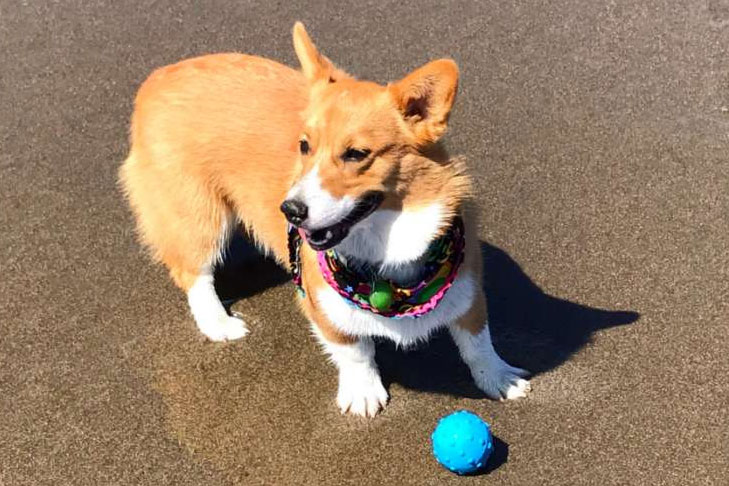FAQ About Corgis
Find out if a corgi is the dog for you
Tax deductible donation to
Sunshine Corgi Rescue
FAQ About Corgis
No. We do in-state adoptions only. We find that we can be more supportive of our dogs and adopters if they remain in the state of Florida.
A corgi is a compact dog, but every bit a working dog. They need exercise, a solid routine, good training, and socialization to be a good companion.
Twice a year corgis shed copious amounts. Generally, they shed daily. Frequent grooming and a good diet help keep this to a minimum. Frequent bathing is not necessary if groomed 2 to 3 times weekly. Please do not shave your corgi. This takes away the coat’s natural defenses of protection from the sun. Shaving a small area around the anus may be helpful for some dogs.
Other grooming necessities would include keeping their toenails trimmed, making sure their ears are clean, and trimming the hair around their foot pads, to help them have better traction on smooth surfaces. It is good to make a general practice of handling your dog all over so they are comfortable with it. This will help you notice any physical changes your dog may have as well as make them more comfortable at the veterinarian.
Some do much better than others. Much depends on continued socialization during their lifetime. Isolated dogs are sometimes not very accepting of other dogs. Generally, all corgis will fight over food. Corgis should be fed in a contained area where no other animal has access. Corgis are typically fine with their people around food.
We have found that corgis receive pure joy in chasing them. If the resident cat is dog savvy, they generally work out an amicable relationship quickly. We often suggest that when a dog is introduced to the home, make sure the cat has a safe place to get away from the dog until they become comfortable with one another.
Corgis do well with “respectful” children. Most are not going to be as tolerant of being grabbed or pulled as some other breeds are. Some corgis are more comfortable with toddlers than others. Supervision is most important as some corgis delight in chasing running and screaming children.
Yes! Many corgis are quite vocal, but this can be controlled with consistent training. They do make good alert systems if someone comes to your door, which most people hope for.
They are very smart dogs and thrive on being trained. They do best with frequent, short training sessions. They can become bored easily with repetitious training. Teaching good obedience and adding some tricks/games along the way will really increase your enjoyment and bond with your dog. Remember to use kind corrections. Corgis are bold but can also be quite sensitive. It is most important that your corgi know YOU are in charge.
The AKC does provide a registration process for dogs that have no papers. It is called the PAL or Purebred Alternative Listing. This would allow you to show your dog in any AKC venue except for confirmation. Information is available on the AKC website.
No! Many people overfeed their dogs and do not provide enough exercise. Most adult corgis stay at a nice weight being fed 1/3 to ½ cup of quality dog food twice daily. Watching their weight is imperative. We receive many obese dogs in our program. This extra weight leads to many health issues down the road. Never free-feed corgis. Always feed them in a contained area away from other animals and remove food bowls immediately. Dogs that are tolerant of feeding together should be separated by several feet when feeding, preferably in different corners of the room and never facing each other.
Corgis are generally robust and healthy dogs. They can have hip dysplasia, which typically does not affect them dramatically unless they are overweight. Some female corgis do get urinary tract infections. It is imperative to monitor these, as chronic infections can lead to serious problems. Corgis are one of the common breeds affected by a genetic disease called Degenerative Myelopathy. Other health problems can occur, but most are not specific to the corgi breed.
Much depends on your lifestyle and your ability to spend sufficient time with your dog. Obviously, you must have time to walk your dog several times daily. You must also be able to provide an outlet for energy release – perhaps with play dates with other dogs.
We find crate training offers a dog their very own personal space. Many dogs do enjoy the den-like feeling of a crate. We feed our dogs in crates. Crate training is also helpful if your dog gets injured or ill and has to be confined. Crate training is helpful if you have large gatherings which may stress some dogs. Crate-trained dogs are welcome in many places if you travel. A crate-trained dog would be a great asset should you ever have to evacuate for a hurricane.
This greatly depends on the particular dog. Having a safely fenced yard is ideal. Make sure the fence is in good repair and there are no little spaces that a corgi could escape. Invisible fences are not recommended. You may have luck keeping your dog inside but you have no way to prevent other animals from entering your yard. We do not encourage outdoor kennels or tie-outs. Corgis like to be with their people and may develop anxious behaviors if housed this way. Tie-outs also do not protect a dog from other dogs or unkind neighbors.
Our mature corgis fit the bill quite well. Many miss out on the most exceptional dogs, as they focus on age far more than a specific dog. Mature dogs do seem to make wonderful companions but are generally up for a game of fetch or an active walk. They are a joy and so easy to have around.
It is rare that we get young pups into the program. Most dogs we receive are between the ages of 2 and 6 though we occasionally get some younger or older. We would be happy to give you advice on how to find reputable breeders if you have your heart set on a pup.
Our dogs come from many sources including shelters, found as strays, and people that can no longer keep them. We do collect as much information as we are able when taking them into our program. All dogs will be spayed or neutered, will be current on vaccinations, heartworm tested, and microchipped before placement. Dogs that have evident health issues will be evaluated by a veterinarian for diagnosis and treatment. Some dogs may require medical maintenance such as prescription foods, medications, or special shampoos. We consider these as our special needs dogs. Adoption fees will be adjusted to help maintain these dogs. We do provide any and all information we have regarding each dog. We do not provide names of former owners nor do we disclose your information to former owners. Privacy is respected.
Our fees are based on each specific adoption. The fees can be as high as $750 for a puppy to $0 for a senior dog or dogs that have special needs. The average adoption fee is about $250.
Dogs are placed using the information provided in your Adoption Application. Frequently, a dog that one chooses from a picture would not make a suitable match for that family. Our dogs do not stay in a centralized location in kennels. All dogs are in foster homes that may be anywhere in the state of Florida.
All dogs adopted will be placed with an adoption contract. The base information includes that you are willing to make the long-term commitment to keep the dog for the rest of its life; you will provide appropriate food, shelter, and veterinary care. If at any time or for any reason you are unable to keep the adopted dog, it will be returned to our organization.
Our organization is willing to help you in any way we can. We will offer advice regarding food choices, training ideas, and how to deal with transitional behaviors. All one needs to do is contact us. Contact information for all board members is found on our Board of Directors page, or you can chat with us on FB messenger.
Our organization is available to offer advice for the lifetime of your dog. We have many knowledgeable volunteers who have owned corgis for many years. It is our goal that each adoption is a good match for both the dog and the owner.
March 17, 2010 By: Penny Eims Below is a copy of the article.
If you have tried to adopt a dog, you know what I’m talking about. Dog Rescues – so many in-depth, personal questions; just to adopt a dog! For goodness sake – do they really need all of that information?
After all – aren’t these homeless dogs? Wouldn’t any owner be better than being a dog, lamenting in rescue? Than being homeless??
Nope – as a matter of fact, those questions and in-depth applications have a purpose. The individuals who run these rescues have seen quite a bit of dog stuff in their day. They have seen the circumstances that brought these dogs into rescue in the first place.
There are a few “real” cases where a dog needs the help of a rescue because the owner has died or fallen gravely ill (please see the article “cancer leaves 2 dogs without an owner”), but the majority of dogs in rescues are there because they had owners who did things all wrong.
So, why does the application ask the names and ages of those in the household? Because they need to know if there are kids in the house that might be at risk if an inappropriate dog is placed in the home.
Why does the application ask you where the dog will be at night, or while you are away? Because many of the dogs in rescue are there because a prior owner had to get rid of them after neighbors complained about constant barking.
Why does the dog rescue care about training? Really, if it is your dog, shouldn’t training (or not training) be your decision? Nope. Many of the dogs in rescues are there because nobody took the time to train them.
The dogs become unruly, hard to own and guess what? Dumped at a shelter or in a rescue. The dogs become somebody else’s problem. Unfortunately, at that point, they are often out of control and require considerable work to even become adoptable.
Why should the rescue know about your prior dog-ownership? Is it really their business? Yep. If you had a couple of dogs that you got rid of after they peed in the house, or because you were having a baby, or god forbid – moving, the rescue needs to know.
You see, rescues would not function if dogs were not re-homed. There would be no need for organizations to exist if all owners kept their dogs, no matter what. If all owners altered their dogs and prevented unwanted litters of puppies. If all owners kept their dogs safely indoors, instead of out in a kennel or yard where they might bark, or even get out of a yard and possibly injure someone or something.
The questions on the application (and if you’re lucky enough to get that far, those asked of you in a phone interview) have been designed to weed out the bad owners. Is the system perfect? No. Nothing is perfect. However, the situations that the rescue organizations have encountered through the years has given them a pretty good idea of what to ask in order to find exceptional homes for the dogs.
Why are exceptional homes needed? So these dogs do not end up without an owner again. So the dogs don’t end up at a shelter where they might be euthanized. The rescues aren’t able to take in every dog that needs a place to go. Too many dogs are in danger at the shelters.
So the next time you are looking to adopt, be prepared to complete a lengthy adoption application and to spend some time chatting on the phone with a volunteer. Don’t be offended or annoyed – be thankful that those rescue-minded individuals care enough about the dogs in their care to ask the questions that need to be asked.
Rescue organizations find some phenomenal homes – amazing people are out there. That being said, so many of the dogs in rescue are amazing too. They are worth the time and effort and they deserve the exceptional home. They deserve a home that will keep them until the end of their days.
And a final note – a bad owner is not better than getting a dog “out” of rescue. Getting out of rescue, only to be left in a kennel for 10 hours a day or chained in a yard is not better than sitting in rescue. Those “sitting” dogs will eventually get adopted and the new owner will not be keeping them in a bad situation.




